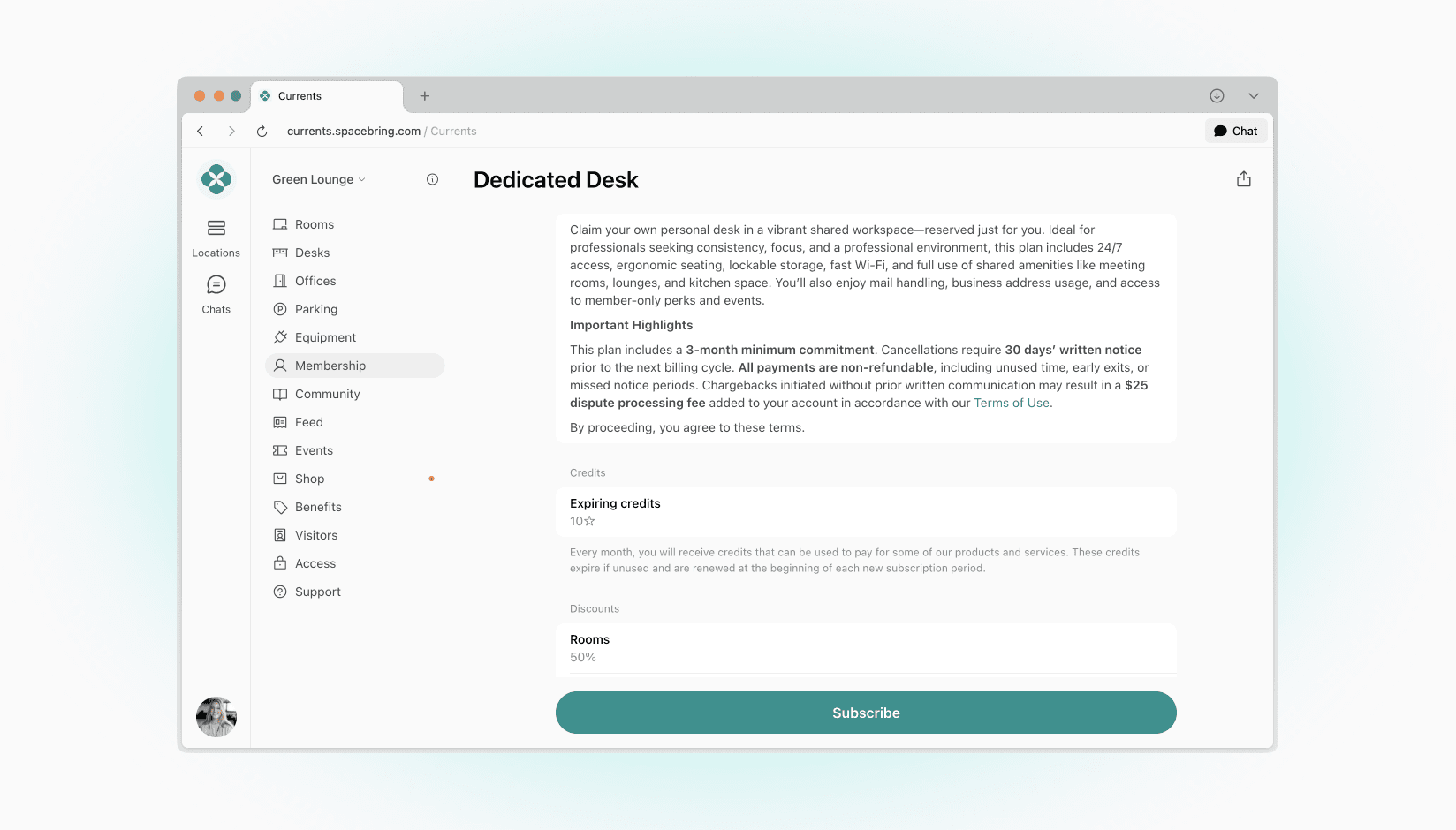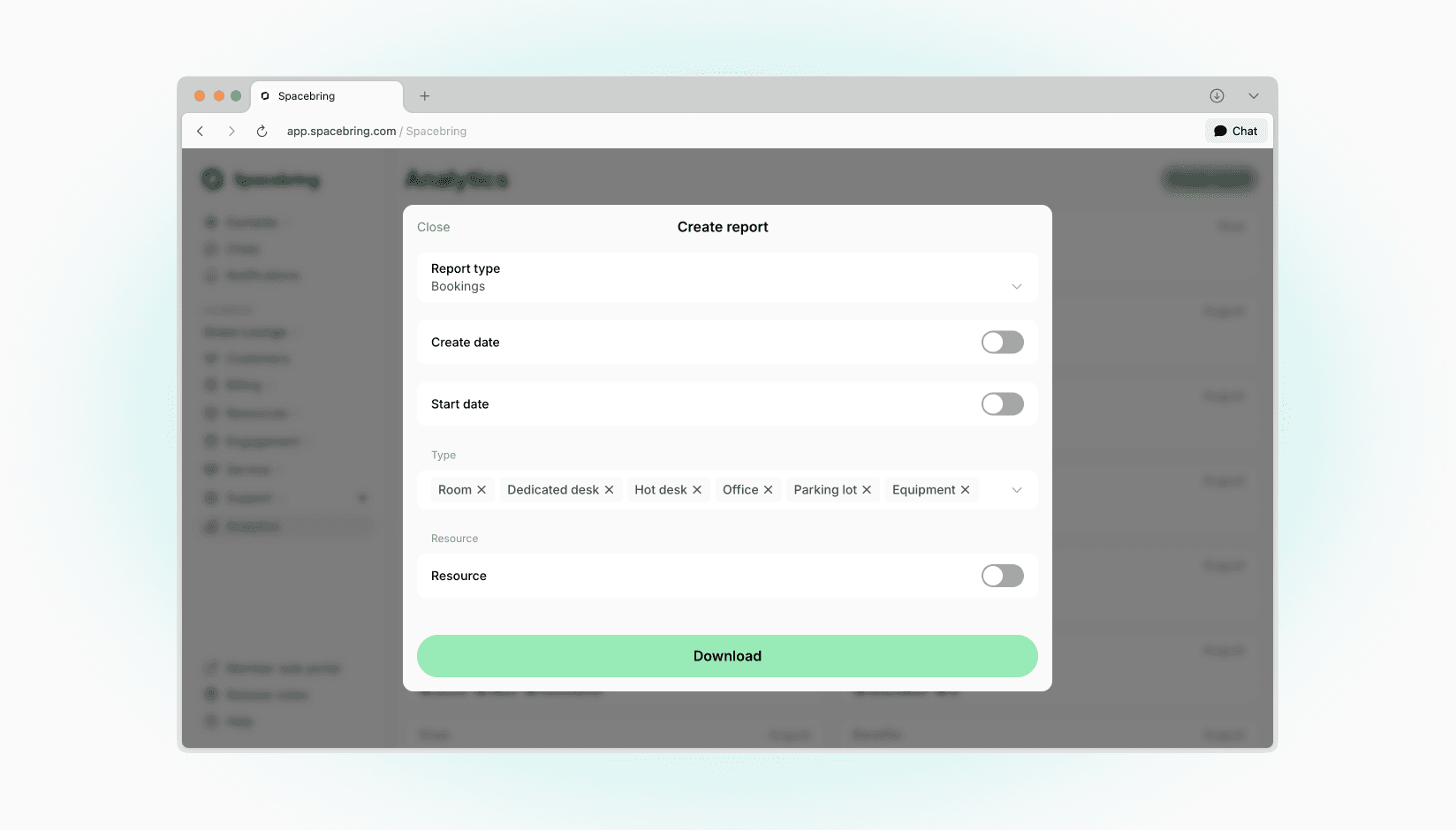Chargebacks and payment disputes are an unfortunate reality for many coworking space operators. No matter how clear your refund and cancellation policies are, you will come across someone who used your coworking space and later disputed the payment with their card issuer.
At Spacebring, we’ve encountered our fair share of chargebacks and have condensed a practical and reusable process for minimizing potential losses and successfully countering disputes. In this guide, you will learn how to prevent chargebacks, resolve disputes amicably, and defend your coworking space business effectively.
Proactive steps to prevent disputes
Danger foreseen is half avoided—the best chargeback is the one that never occurs. Prevention starts with radically honest communication and transparent documentation. It creates trust and reduces the likelihood of disputes arising from misunderstandings.
First, make your terms of use publicly available on your website or coworking space management software. Use plain language to describe refund policies, cancellation terms, and commitment periods, for all your products and services. Avoid legal jargon and keep sentences short.
Tip: Our Spacebring blog covers must-have clauses for coworking space agreements.
Second, reinforce your key policies at checkout. Don’t hide your minimum commitment, non-refundable cancellation policy, or advance cancellation notices somewhere deep in the fine print.
Use a summarizer to summarize and show a summary of your cancellation terms to your coworking space members during checkout flow or plan description, so people can’t say they haven’t been aware of them at signup.

Most payment gateways have a chargeback fee (typically $15-25). To prevent losses, introduce a clause in your coworking space member agreement that states if a chargeback is initiated, the member agrees to pay a dispute processing fee.
Finally, try to collect member signatures on a document. Use eSignature tools (DocuSign, PandaDoc, or built-in features in Spacebring) to capture digital or physical signatures on your order forms, terms, or quotes. Signed agreements dramatically increase your chances of winning a dispute.
Your action plan:
- Clearly describe refund and cancellation policy in plain English
- Publish terms of use on your website
- Highlight key refund and cancellation terms during checkout
- Add a dispute fee clause
- Collect signed agreements whenever possible
Attempting peaceful resolution with members
Extend an olive branch, but don’t plant a whole grove—consider resolving the issue directly with the member. You are focused on a bigger picture of your business success. Dealing with difficult customers can be a distraction from that. A mutual resolution can save your time and money.
If a member is objecting to an upcoming mandatory payment, offer a mutually beneficial and acceptable peaceful settlement option to receive an exception in exchange for something truly helpful to your business. Think of it in terms of cost of opportunity. It could be a couple positive reviews on social media or Google Maps, a video testimonial, a case study, or anything that would leave you with additional trust you can use to grow your business.
If a member demands a refund that goes against your coworking space refund rules, offer a partial credit towards upcoming invoices, meeting room booking credits, or other custom arrangement instead.
Keep it professional and traceable. When you offer a peaceful settlement, use email to communicate with a member (the same email the member used to sign up), so there’s a timestamped record. Avoid chats (where messages can be unsent) and verbal negotiations (unless recorded with prior consent). In any case, take screenshots with clearly visible time stamps and identifiable information.
At this stage it is common for people to indulge in manipulative threats and passive aggression. Expect emotionally charged messages like:
- “I’ll leave a bad review unless you refund me.”
- “You should support solopreneurs like me.”
- “This is not how a good company behaves.”
Stay calm and professional even if a customer threatens you. Stay firm and not confrontational. Do not threaten back or withhold personal information or belongings (it may be illegal). Also, do not make their personal data or belongings hostage—in some countries it’s illegal.
Your action plan:
- Create an email template with peaceful resolution offers
- Use email to communicate
- Screenshot any relevant messages from the start
- Maintain professionalism
Defend against coworking space chargebacks
Hold your ground like a mountain—timely and organized evidence is your best weapon.
What evidence to collect:
- Take a screenshot of the published terms of use with the URL and visible timestamp.
- Your cancellation terms disclosure — a screenshot of the place during your checkout flow where your coworking cancellation policy appears to users.
- The order form or equivalent document with your customer’s signature.
- The associated invoice and receipt that were sent to your members when the payment was successful. Make sure that it clearly describes the products and services provided. If you’re on Spacebring, you can easily download that on the Billing > Invoices page.
- Any other evidence that your coworking space member actually used the space during the disputed period, for example video footage from your security cameras, access control logs, Wi-Fi usage logs, or booking records.
Assume a bank employee has 5 minutes to skim through your evidence. Highlight and annotate relevant paragraphs in your PDF files, such as member name and email, signature and agreement dates, plus evidence of usage.
Tip: Use your coworking software (like Spacebring) to quickly export invoices, member bookings, and other logs.

Upload all this evidence to your payment provider as soon as possible. Do not wait until the last minute because banks have their own limited schedule and holidays.
Your action plan:
- Review your payment gateway chargeback documentation
- Compile all supporting evidence into PDF files
- Highlight key areas for easy skimming
- Submit docs early, not waiting until the deadline
Final thoughts
Handling disputes is part of running your coworking space business. But with the right approach, you can reduce chargebacks, peacefully resolve conflicts, and defend your business needs.
A coworking space management platform like Spacebring can host your terms of service, display highlights of key terms to members at signup, and generate evidence you need to win disputes. If you’re not using Spacebring, book a demo to discover how we can help you protect your revenue and peace of mind.
Frequently Asked Questions (FAQ)
Q: Can I legally charge a member a dispute fee?
A: Yes, provided they have agreed to it in your terms of service or signed agreement. This is why it is important to publicise your terms of use and to collect acknowledgement during signup.
Q: What's the single best piece of evidence to win a chargeback?
A: A combination of a signed agreement and a proof of usage of your coworking space is the most compelling. In other words, if you can show a signed contract and proof they badged into the workspace during the time they're disputing, this creates a powerful and irrefutable case that you’ve delivered as agreed.
Q: A member is threatening to leave a bad review about my coworking space unless I refund them. What should I do?
A: Politely offer a peaceful resolution, such as partial credit or a promo code with discount. If the member refuses and proceeds with a chargeback, and posts a negative review afterward, document everything. You can contact the review platform with evidence of the blackmail attempt — most platforms prohibit reviews tied to refund threats, made under coercion or in retaliation. Alternatively, respond publicly and professionally clarifying that the member violated the agreed terms and express your hope that future experiences are more positive. This approach builds trust with potential members reading those reviews.






